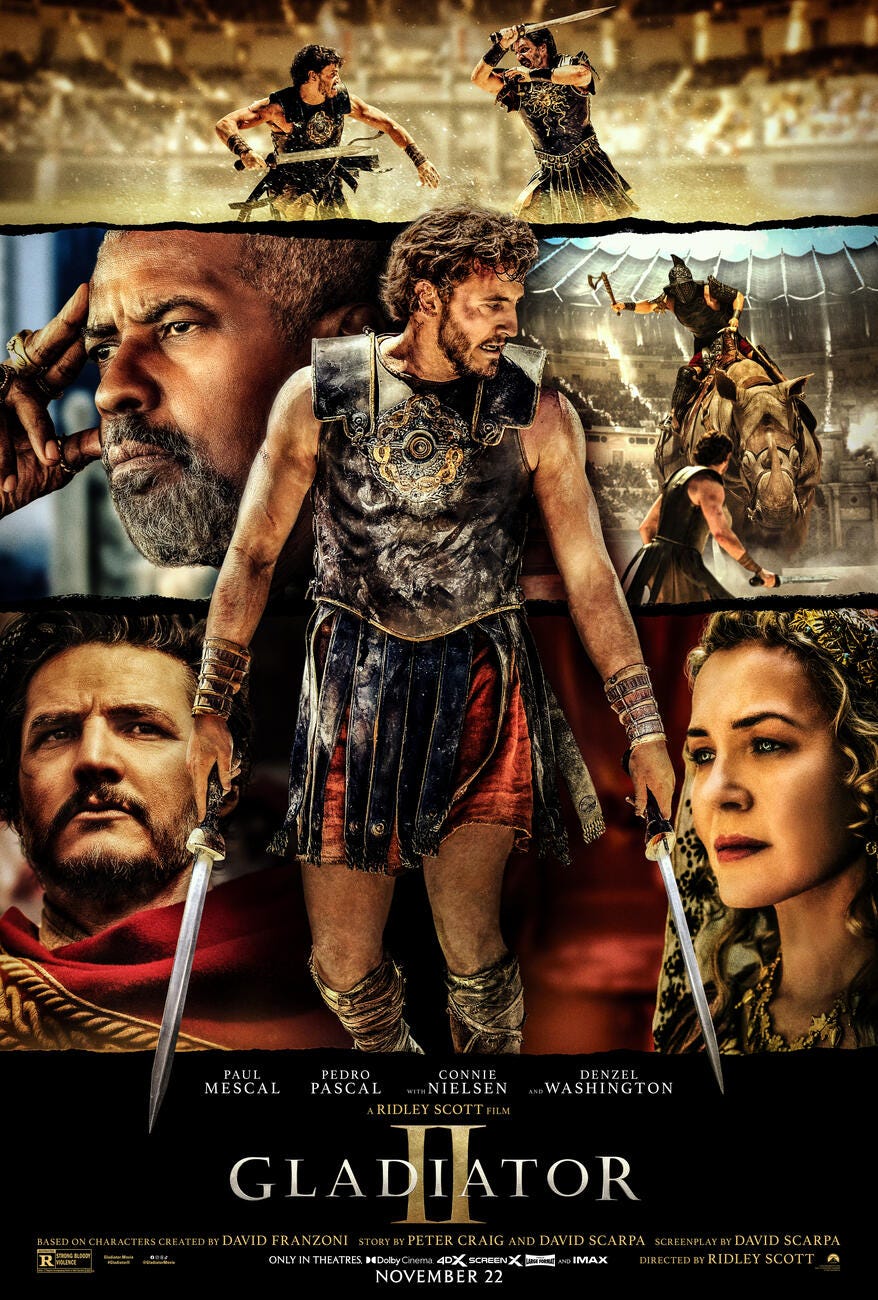Review: 'Gladiator II' Is A Fun Legacy Sequel That Overly Lionizes Its Predecessor
Ridley Scott's 'Gladiator' follow-up is timely and appropriately angry, but its reverence for the original film's protagonist eventually undercuts its narrative and its convictions.
Gladiator II
2024/148 minutes/rated R (for strong bloody violence)
Directed by Ridley Scott
Written by David Scarpa (story by Scarpa and Peter Craig)
Starring Paul Mescal, Denzel Washington, Pedro Pascal and Connie Nielsen
Opening theatrically courtesy of Paramount Pictures
If the unofficial tagline of Gladiator was “Are you not entertained?” then the tagline for Gladiator II is closer to “Are you not reminded of Ridley Scott’s Oscar-winning epic Gladiator and specifically of its towering hero Maximus Decimus Meridius?!” Hollywood’s latest attempt to turn a one-and-done blockbuster into a replenishable IP, this big-scale and blustery action melodrama falls into the traps plaguing the last decade’s worth of legacy sequels. Is it a glorified remake of the first film? Is its young protagonist 94% defined by their relationship to the first film’s hero? Does it try to deconstruct the clearer-cut narrative of its predecessor, only to be undercut by a requirement of reverence to treat that first film as an unimpeachable gospel? Yes, x3!
To be fair, you don’t spend $250 million on Gladiator II and not make a film that doesn’t appeal to folks who think Gladiator was a classic and that Maximus was a god among men. This film’s often childlike reverence for essentially itself makes me feel slightly fonder toward the other recent “legacy sequel from the first film’s original director,” Tim Burton’s Beetlejuice Beetlejuice. As overstuffed and undisciplined as it was, it at least didn’t treat Beetlejuice like one of the books of the bible. What’s frustrating is how what begins as a genuine fair play sequel in terms of representing the world as it is and thus heading toward a different endgame. Alas, it eventually changes its mind to reaffirm the correctness of its original protagonist.
Like the first Gladiator, it’s the story of a soldier who loses loved ones to violence and becomes enslaved by his oppressors, only to show strength and crowdpleasing cunning in the arena. We quickly discover that Lucious Verus (Paul Mescal) is the grown-up incarnation of the young child (Spencer Treat Clark) who befriended Maximus. Moreover, as revealed in the second trailer, his connection to Russell Crowe’s Oscar-winning protagonist is more direct. Twenty years after Maximus killed the tyrannical emperor at the cost of his own life, his dream of a more explicitly democratic Rome has remained a fantasy. As Lucious mourns his loss and adjusts to his new life in bondage, he has already given up on anything beyond his vengeance.
Lucious’s target is not a villain but a Roman general (played by Pedro Pascal) who has more in common – morally and politically -- with the late Maximus than the tyrannical twin emperors (Joseph Quinn and Fred Hechinger) currently on the throne(s). Oh, and Marcus Acacius is currently shacking up with Lucious’s mother, Lucilla (a returning Connie Nielsen). The other wild card is Macrinus (Denzel Washington), a former slave who controls the gladiators and may have grander plans afoot. While many of the plot beats feel cribbed from its predecessor, the first half creates slightly more complicated conflicts, with our hero chasing vengeance against a sympathetic foe and the charismatic schemer not exactly earning our ire for wanting to change the current hierarchy of power.
However, David Scarpa’s screenplay eventually becomes anchored to the mythology of its predecessor, with endless callbacks (in terms of dialogue and action beats) and repeated reverent references both to Maximus and to the philosophy he and Marcus Aurelius espoused before their violent deaths. Lucious becomes entirely defined by his connection to Maximus, right down to (minor spoiler) wearing his armor as if it were a “comic book-accurate costume.” “Meanwhile, the “virtuous” characters eventually do little more than showering praise on the original Gladiator. While the pieces are arranged to arrive at a more challenging destination, it chickens out for a conventional finale that feels false both to the times in which it was made and (more importantly) to the film itself.
Confession: I merely *like* Gladiator. I’ve long preferred Troy, The Last Samurai (NINJAS!!!) and The Patriot. I’d anoint the less “crowdpleasing” Kingdom of Heaven as Scott’s best film. My bitching aside, I enjoyed Gladiator II more than its predecessor. Credit the superior action scenes and Washington’s showy turn. The mass battles and arena combat sequences are clean, colorful and coherent, with a variety of gladiator scenarios that gleefully ignore the history books when applicable. Watching Washinton’s initially trivial character grow in scope and impact is delightful. Spoiler: He’s not just doing a favor for Ridley Scott by showing up in a few trailer-friendly beats. It’s yet another classic “Denzel tricks Hollywood into thinking this promising young white guy is actually a movie star” performance.
Beyond my ongoing legacy sequel gripes, Gladiator II is an enjoyable time at the multiplex. The money is on the screen, while production values and technical specs are top-notch. It may be the best-directed film from a guy over the age of 82 since (coin toss) Scott’s own The Last Duel (also one of his best movies) or Sidney Lumet’s Before the Devil Knows You’re Dead. I wish it weren’t as hamstrung by the legacy sequel/generational nostalgia circumstances. And yes, this whole “your parents or grandparents’ culture is the only one that matters” schtick is a problem if only in terms of getting young viewers to show up in theaters. Gladiator II won’t echo in eternity, but it will leave most audiences not-not entertained.







With you on Gladiator 1. It was a less stirring Braveheart with shaky cam - the most obnoxious trend in cinematic history.